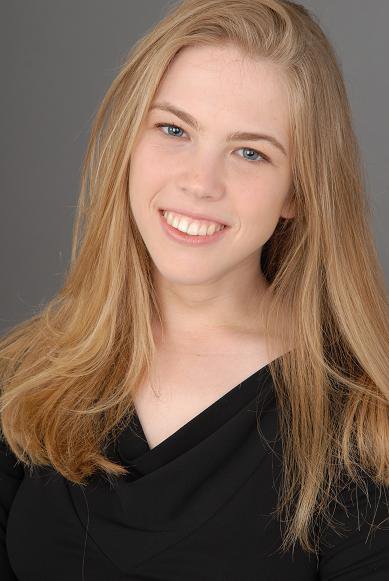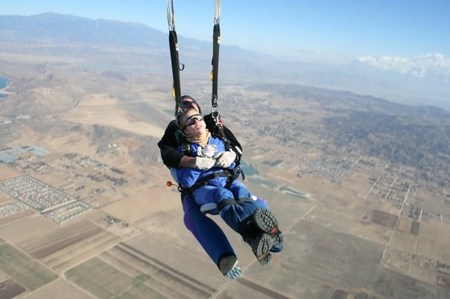Young Comedian Breaks Barriers On Stage

Stand-up comedy is Allison Gray's passion.
(Photo used with permission from Allison Gray)
People treat Allison Cameron Gray, 21, differently.
"They stare," she said in one of her stand-up --sit-down, rather-- comedy routines at Pasadena's Ice House Comedy Club in 2009.
The punch line: "I just wanna say, 'I know I'm beautiful, but you are embarrassing me!'"
The slender, blue-eyed blonde, clad in a trendy floral Henley tee shirt, has a lot to say on and off the stage. But it's not easy.
To able-bodied people, Gray's life can seem overwhelmingly difficult, yet the daily ups and downs provide her with excellent comedic fodder.
Gray has lived in Van Nuys her whole life. She lives mostly with her mother on a sun-dappled street lined with giant trees. A long black ramp stretches up to her front door and three giant dogs --a golden retriever, Great Dane and pit bull mix-- are the first to greet visitors. The dogs, Mimi, Shadow and Stella, are part of the family, Gray explained. Mimi, the shaggy golden retriever, sticks around for the interview, thrusting her head onto Gray's lap as she strokes her fur. When Stella sneaks back into the house, not wanting to be left out, Gray's face lights up and she convulses with laughter. "My dogs are like my brothers and sisters," she said.
Gray was born with athetoid cerebral palsy, a brain disorder that causes involuntary movements that interfere with speaking, feeding, reaching, grasping and other skills requiring coordination, according to the website about-cerebral-palsy.org.
A United States study by the Center for Disease Control found that 1 in 303 children have cerebral palsy, which is the most common cause of motor disability in childhood. Athetoid is the second most common cerebral palsy diagnosis, according to the CDC website.
To get around, Gray uses a walker for short distances and a motor wheelchair for longer distances. An assistant helps her with day-to-day tasks like typing and cleaning for several hours a week.
When Gray speaks, her face moves from a smile to a grimace to a squint as her limbs jerk and twitch. Her voice oscillates, making articulation difficult. With years of speech therapy behind her, Gray determinedly grapples with each syllable. That doesn't stop her from saying exactly what's on her mind, whether it's making fun of the yippy Chihuahua next door --which she says looks like a soccer ball-- or clarifying how she sees herself as a comedian.
A part-time third-year student at Los Angeles Valley College, Gray is awaiting a reply from the University of Southern California, where she applied to continue her screenwriting and film education.
Her interest in the entertainment industry stems from her childhood acting experience. When she was 10, she enrolled in her first private acting class, taking on characters in plays. Her parents never pushed her into acting. Rather, Gray had to convince them to let her start taking acting classes.
"They thought it was a phase because when I was a little kid, I would dress up as Beauty [from Beauty and the Beast] and be like, 'I wanna be on TV," she reminisced. Her parents never encouraged the hobby, but they didn't discourage it either.
When Allison was 12, she guest starred in the television drama, "Family Law." She is a Screen Actors Guild member and continues to act for the webseries, "The Queerburgs," created by Mike Hennessey.
In high school, she began to write.
"I started writing because everyone says if you wanna act, you have to be able to write," she said. Her writing tended to be comic, so she took a stand-up comedy class that she hoped would aid her script writing.
At the end of the class, a man from the Comedy Store --a stand-up venue in West Hollywood-- invited her to perform there.
"It's been history ever since," she said.
She hopes to make a career out of her love for comedy. "I want to do comedy in some form, whether stand-up or...I would really like to write jokes for shows or sitcoms," she said. "I guess I'm hoping everything will combine."
Gray's routines mostly involve poking fun at herself and getting people to laugh and open up to disability. She is inspired by other comedians with cerebral palsy such as Geri Jewell and Gray's idol, Chris Fonseca.
"I definitely use my act to break down barriers and every comic with a disability has made an attempt" to do the same, she said.
Some of the struggles she faces aren't as funny as others, however.
A director refused to work with her once because he didn't feel confidant in his ability to work with her. She said Chris Fonseca told her his response to someone who didn't want to hire him because of his speech disorder: "Listen to the audience laughing --they get it."
Gray said she thinks she'll have to say the same thing if she encounters similar resistance. "I'm prepared to kind of be like, 'You really need to give me a chance and I can prove you wrong,'" she said.
In addition to frustrations that come with the business, Gray must handle the hurtful assumptions people make when she goes out.
Recently, for example, she went to a restaurant and the waiter handed her a children's sippy cup without asking her if she needed it. Additionally, she often deals with people who assume she is mentally challenged --which she is not.
"It's insulting because they're making assumptions without getting to know me," she said. "You don't need to talk down to me." It only takes a few moments to gauge her mental status.
While her most distinguishing trait is cerebral palsy, Gray said she doesn't see herself as a disabled comedian in the way that she used to; instead, she tries to market herself as a comedian who just happens to have cerebral palsy.
"I don't want that to be my whole routine," she said. "I want my material to grow. I want to talk about my life as a whole."
She draws confidence from her personal experiences. "You just have to be confident about your take on things, " she said.
Coming up with routines is never an easy process --sometimes it can take months-- but she tries to go with material that has fresh perspectives and well-worded punch lines, she said.
She likes to open with a joke about how cruel it is for a speech disability to have such a hard-to-pronounce name as cerebral palsy. From there, Gray tosses out snarky remarks about how she moves and talks and the way people perceive her.
Being in the spotlight is nerve wracking at times, she said, especially beforehand.
"After a few minutes, it gets better," she said, "It's an amazing feeling hearing the audience laughing and you feel a connection with them for that amount of time."
Every audience reacts differently to her. Sometimes the people don't quite get what she's doing. It takes a few minutes for some to realize she really is physically challenged and not acting. She said she's noticed she can more easily charm a crowd if she is following a good comedian.
"You also want the audience to have a good amount of alcohol...not drunk but feeling relaxed," she half-joked.
So far, she has performed at all of the major comedy venues in LA, and then some, except for the Laugh Factory, she said. Her performances usually last five to 10 minutes. Audiences vary --anywhere from 40 to 100 people; it depends on the venue, she said.
Her next gig will be a 10-minute segment opening for Chris Fonseca at Brea Improv on May 5. She will also co-produce a variety show for the first time at the Hollywood Fringe Festival in June.
Besides being a comedian, Gray is a painter --she sold several pieces of her work when she was younger and her colorful brushstrokes adorn her mother's house, from the living room to the kitchen to her own bedroom. The most recent piece is of a large star hanging in the clouds, emanating streaks of metallic silvers and golds. She said she wanted a piece that represents Hollywood.

(photo used with permission from Allison Gray)
She almost forgot to mention her skydiving interest, which has become more of a hobby since she's gone four times.
A teacher used to tell her to "do what scares you," so she took those words to heart and leapt off a plane for the first time when she turned 18.
"In a way, I felt like I have almost died when I was born so I feel like, OK, if I'm meant to be here, why not live life?" she said. "If I'm going to die young, I wanna die doing something fun."
She ended the skydiving pastime when she tackled comedy.
"I'm putting my life on the line on stage," she said, "I don't need to jump out of planes."



